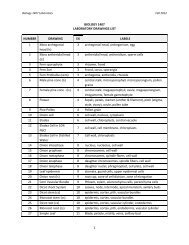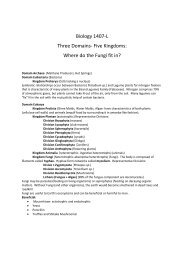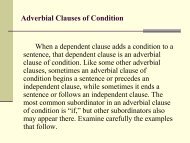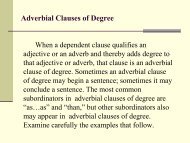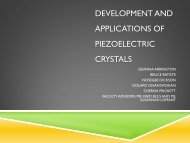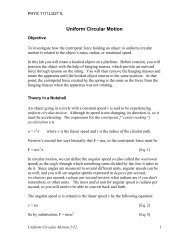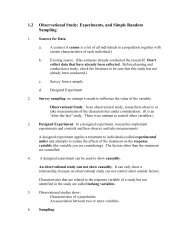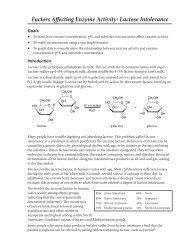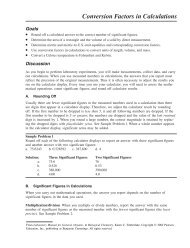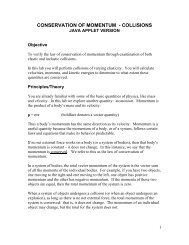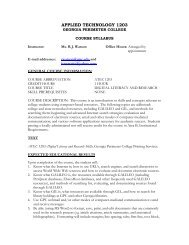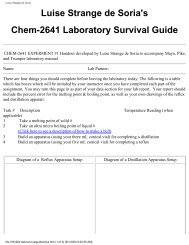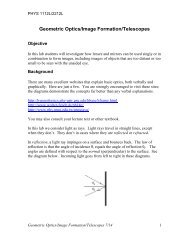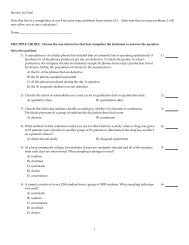Science Laboratory Safety Contract for Students - Faculty & Staff ...
Science Laboratory Safety Contract for Students - Faculty & Staff ...
Science Laboratory Safety Contract for Students - Faculty & Staff ...
You also want an ePaper? Increase the reach of your titles
YUMPU automatically turns print PDFs into web optimized ePapers that Google loves.
2010<br />
<strong>Science</strong> <strong>Laboratory</strong> <strong>Safety</strong> <strong>Contract</strong> <strong>for</strong> <strong>Students</strong><br />
Universal <strong>Science</strong> <strong>Laboratory</strong> Agreement <strong>for</strong><br />
Georgia Perimeter College<br />
<strong>Science</strong> Lab course number Semester and year Campus<br />
Instructor Meeting Day/Time Room number<br />
<strong>Students</strong> will not be permitted to remain in the science laboratory or ISCI classroom without completing and signing this<br />
document.<br />
Student Name (printed): ________________________________ GPC Student ID number: ______________________<br />
I acknowledge and agree to all of the following:<br />
<br />
<br />
<br />
<br />
<br />
<br />
<br />
<br />
I have received a printed copy, or the address of an electronic copy, of the <strong>Science</strong> <strong>Laboratory</strong> <strong>Safety</strong> Guidelines.<br />
I have read carefully and understand all of the <strong>Science</strong> <strong>Laboratory</strong> <strong>Safety</strong> Guidelines provided to me.<br />
I understand that I am responsible <strong>for</strong> following the <strong>Science</strong> <strong>Laboratory</strong> <strong>Safety</strong> Guidelines at all times.<br />
I understand that my safety and the safety of my classmates depend on my actions in the science laboratory.<br />
I understand that failure to follow these <strong>Science</strong> <strong>Laboratory</strong> <strong>Safety</strong> Guidelines could result in a serious accident or injury.<br />
I understand that students who do not follow the <strong>Science</strong> <strong>Laboratory</strong> <strong>Safety</strong> Guidelines may be asked to leave the<br />
laboratory and will receive no credit <strong>for</strong> the missed exercise or assignment. Multiple violations of the <strong>Science</strong> <strong>Laboratory</strong><br />
<strong>Safety</strong> Guidelines could result in disciplinary sanctions, which can include expulsion.<br />
I am aware that science laboratories contain materials which, if handled improperly, may be hazardous, particularly <strong>for</strong><br />
students with chronic medical issues or students who are pregnant or nursing. I will consult my physician or health care<br />
provider about potential risks associated with the laboratory if I have a medical issue or concern. I understand that if I wish<br />
to withdraw from the laboratory after consultation with my physician or health care provider, I will need to submit a letter<br />
from the physician or health care provider within the first two weeks of class indicating that I should not continue in the<br />
laboratory due to a health risk. I understand that I assume all liability if I decide to remain in the laboratory portion of the<br />
course.<br />
I agree to indemnify and hold Georgia Perimeter College, its employees and agents harmless from any and all actions or<br />
claims arising as a result of participation in science laboratory activities. I also understand that any activity involves some<br />
element of risk <strong>for</strong> which the College is not responsible.<br />
Signature ____________________________________ Date _________________<br />
1
2010<br />
<strong>Science</strong> <strong>Laboratory</strong> <strong>Safety</strong> Guidelines<br />
General <strong>Science</strong> <strong>Laboratory</strong> <strong>Safety</strong> Guidelines (applicable to all <strong>Science</strong> laboratories)<br />
1. Be familiar with and follow these <strong>Science</strong> <strong>Laboratory</strong> <strong>Safety</strong> Guidelines.<br />
2. Prepare be<strong>for</strong>e you come to lab. Read your laboratory manual or other assigned readings and instructions carefully<br />
be<strong>for</strong>e lab. Pay close attention to any safety concerns.<br />
3. Listen carefully to instructions given be<strong>for</strong>e, during and after the lab.<br />
4. Come to the laboratory prepared to per<strong>for</strong>m laboratory experiments or activities. Obtain and bring all personal<br />
protective equipment required by the instructor or by laboratory guidelines. This may include gloves, goggles,<br />
laboratory coats, aprons, etc. You are responsible <strong>for</strong> inspecting your personal safety equipment <strong>for</strong> leaks, tears or<br />
damage, and replacing it as necessary to avoid accident or personal injury.<br />
5. Come to the laboratory dressed appropriately <strong>for</strong> all possible safety hazards. This includes the following:<br />
a. Closed-toed shoes must be worn in all science laboratories. Open-toed shoes, shoes with holes or openings on<br />
the foot, sandals, flip flops, ballet slippers, flats which expose the top of the foot, high heels, and plat<strong>for</strong>m<br />
shoes shall not be worn to the science laboratory. <strong>Laboratory</strong> activities may expose you to hazardous<br />
chemicals, heated, or heavy items that may injure the feet if spilled or dropped. Shoes should be made of an<br />
impermeable material such as leather. Cloth shoes which may permit hazardous chemicals to penetrate.<br />
b. Avoid exposed skin in science laboratories. Shorts, skirts which expose the legs, pants with holes, exposed<br />
midriffs, and cleavage or plunging necklines are not appropriate <strong>for</strong> a science laboratory. Painful burns and<br />
disfiguring scars may result from exposure of bare skin to chemicals. Long pants and long sleeves are<br />
recommended. Tights and panty hose are not adequate leg covering. <strong>Laboratory</strong> coats or aprons are strongly<br />
encouraged.<br />
c. Do not wear loose fitting clothing, flowing sleeves, dangling scarves or jewelry, heavy coats, or jackets in the<br />
laboratory. Loose fitting clothing or dangling scarves or jewelry can get caught on equipment or get into<br />
flames or chemicals.<br />
d. Pull back or otherwise secure long hair, headscarves, hijabs, and other loose clothing. As an option, personal<br />
protective devices, such as personal face veils and masks may be used.<br />
e. Use appropriate personal protective equipment, such as goggles or gloves, when working with chemicals,<br />
small particles or projectiles, flames or sources of heat, or as directed by your instructor.<br />
f. If “loaner” goggles are used, they should be sanitized between uses.<br />
6. In case of medical emergency, students should carry a wallet card with emergency contacts, and medical in<strong>for</strong>mation<br />
including allergies, medical conditions, medications, physician’s name and phone number, and health insurance<br />
in<strong>for</strong>mation.<br />
7. Do not bring food or drink into any laboratory unless it is to be used as part of a laboratory experiment.<br />
8. Do not eat, drink, smoke, chew gum, or apply cosmetics (including hand lotion and lip balm) in any laboratory room<br />
where hazardous chemicals, radioactive materials, or biohazards are used or stored. Do not taste or put anything into<br />
the mouth in the laboratory.<br />
9. Keep hands, writing instruments, and laboratory materials away from face and mouth.<br />
10. Georgia Perimeter College prohibits student use of cell phones, pagers, or similar communication devices in<br />
classrooms, laboratory areas, libraries, and Learning and Tutoring Centers. Exceptions to this policy, due to special<br />
circumstances, shall be at the discretion of the <strong>Laboratory</strong> Supervisor in the individual area.<br />
11. <strong>Students</strong> are not permitted in the laboratory without the supervision of an instructor at any time. Please wait outside<br />
the room until your instructor arrives. Only students officially enrolled in the course may be present in the laboratory<br />
except <strong>for</strong> brief tours/visits with the <strong>Laboratory</strong> Supervisor or instructor present.<br />
12. <strong>Students</strong> are not permitted in the laboratory prep rooms or chemical storage areas at any time.<br />
13. <strong>Students</strong> should be aware that science laboratories contain materials which, if handled improperly, may be hazardous.<br />
Material <strong>Safety</strong> Data Sheets (MSDS), which describe hazards associated with the chemicals used in the science<br />
laboratory, are available from the instructor or <strong>Laboratory</strong> Supervisor. <strong>Students</strong> are free to examine MSDS, but may<br />
not remove them from the laboratory. MSDS are also available online. http://www.usg.edu/ehs/library/msds.phtml.<br />
2
2010<br />
14. For your protection, bandage all exposed cuts be<strong>for</strong>e dissecting or using chemicals.<br />
15. All body fluids are considered to be potential biological hazards. If a body fluid is present in lab due to injury, accident, or as<br />
part of an experiment, personal protective equipment such as gloves and goggles must be used when handling or cleaning<br />
up potentially hazardous biological material.<br />
16. <strong>Students</strong> who have, or who develop, chronic medical issues such as (but not limited to) hypoglycemia, diabetes,<br />
epilepsy, heart ailments, any other medical condition which may cause sudden loss of consciousness, and students who<br />
are pregnant or nursing, should consult with their physicians or health care providers as soon as possible about<br />
potential risks associated with participation in a science laboratory. Such students assume all liability if they decide to<br />
remain in the laboratory portion of the class. A student who wishes to withdraw from a laboratory after consultation<br />
with his/her physician or health care provider should submit a letter from the physician or health care provider<br />
indicating that the student should not continue in the laboratory due to a health risk.<br />
17. IMMEDIATELY notify your instructor <strong>for</strong> assistance If you are injured, or if any type of accident, chemical spill, or<br />
breakage occurs.<br />
18. Familiarize yourself in advance of the location and proper use of safety equipment such as fire alarm, fire extinguisher,<br />
emergency eyewash, safety shower, fire blanket, and phone.<br />
19. Use step stools to reach high objects. Never stand on laboratory stools or chairs.<br />
20. Maintain a neat laboratory workspace with work area and aisles free of personal items. Do not create trip hazards.<br />
Know the location of the nearest exit. Pathways to exits must be clear.<br />
21. Conduct only those experiments authorized by the syllabus or the instructor.<br />
22. Never handle equipment, supplies, or chemicals until you have been given specific in<strong>for</strong>mation on their use and safety<br />
considerations.<br />
23. Guidelines <strong>for</strong> the use of equipment, supplies and chemicals including the following:<br />
a. Observe and respect all safety signs on equipment.<br />
b. Avoid direct contact with hazardous chemicals.<br />
c. Use all equipment and hazardous chemicals only in accordance with their intended purpose.<br />
d. If you open any container, re-cap it securely.<br />
e. Use care when dealing with laboratory burners, hot plates and steam generators. Turn such equipment off<br />
when not in use. Always handle such equipment as if it were hot, even when you do not see a flame or it<br />
appears to be off.<br />
f. Keep laboratory equipment and breakable items away from edges of tables, benches, or counters.<br />
g. Carry microscopes with both hands.<br />
h. Do not use microscopes if you have an eye infection.<br />
i. Be alert <strong>for</strong> sharp or broken objects which may cause injury.<br />
j. Do not use cracked or chipped laboratory glassware.<br />
24. <strong>Students</strong> must follow all guidelines <strong>for</strong> disposal of materials including:<br />
a. Do not attempt to clean up broken glass, a chemical spill, or breakage of a mercury thermometer by yourself.<br />
Notify your instructor IMMEDIATELY in the event of a breakage or a chemical spill.<br />
b. Dispose of needles, nails, and other sharp objects in an approved sharps container.<br />
c. Dispose of broken glass in a broken glass container.<br />
d. Dispose of other hazardous materials as specified by your instructor.<br />
e. Correctly discard any excess reagents. Do not return any excess reagent to the stock bottle.<br />
f. Dispose of all chemical waste in the proper waste container as indicated by your instructor. NEVER pour any<br />
chemical down the sink without explicit permission from your instructor.<br />
25. No horseplay will be permitted in the laboratory. Do not distract or startle other people when they are handling<br />
hazardous materials.<br />
26. Any student who endangers another's safety or his/her own safety will be <strong>for</strong>bidden use of the laboratory.<br />
27. Damage, destruction, or theft of Georgia Perimeter College property is prohibited and will be subject to punishment<br />
prescribed in accordance with the Student Responsibilities Section of the Georgia Perimeter College Student Handbook<br />
or other appropriate policies.<br />
28. Reconfiguring the laboratory computers or installing any program onto the laboratory computers is prohibited.<br />
29. Be<strong>for</strong>e leaving the laboratory:<br />
a. Clean up after yourself in all science laboratory areas. Clean and return all materials to their proper location.<br />
Wash test tubes, beakers, and other glassware. Thoroughly wipe down your laboratory space be<strong>for</strong>e and after<br />
each exercise with cleaning liquids provided.<br />
3
2010<br />
b. Turn off all gas nozzles and water faucets be<strong>for</strong>e leaving the laboratory. Turn off and unplug all hotplates,<br />
meters, and other electrical items be<strong>for</strong>e leaving the laboratory.<br />
c. Disassemble your experimental set up and leave your laboratory station as you found it. For instance, remove<br />
any clamps, tape, string, etc. that you placed on the equipment.<br />
d. Return items that you have used to their storage locations.<br />
e. Sinks are not trash receptacles. Do not dispose of any trash in the sink.<br />
f. Wash your hands with soap and water be<strong>for</strong>e you leave the laboratory.<br />
g. No laboratory material is to leave the laboratory.<br />
30. In laboratories with controlled ventilation systems, doors must remain closed.<br />
31. It is the goal of Georgia Perimeter College to provide a safe and effective environment <strong>for</strong> students and employees to learn<br />
and to work. Generally, children under the age of sixteen (16) are not allowed in the College classroom(s). Due to the<br />
particular dangers in the College laboratories, under no circumstances, whatsoever, should children be allowed in the<br />
College laboratories. The policy shall not apply to students under the age of sixteen who are enrolled in a course or<br />
program, either <strong>for</strong> credit or non-credit, or recreation, or who are attending any event on campus which is open to the<br />
public.<br />
All science laboratory students are required to comply with <strong>Science</strong> <strong>Laboratory</strong> <strong>Safety</strong> Guidelines as specified in this document<br />
and any additional guidelines that may be listed in their course syllabi. Any student who does not comply with these <strong>Science</strong><br />
<strong>Laboratory</strong> <strong>Safety</strong> Guidelines will be subject to the following penalties:<br />
Violation<br />
First <strong>Safety</strong> Violation<br />
Second <strong>Safety</strong> Violation<br />
Third <strong>Safety</strong> Violation<br />
Consequence<br />
Warning<br />
Removal from laboratory class and assignment of a zero <strong>for</strong><br />
that laboratory class period. The Instructor will complete the<br />
Disruptive Behavior Form. See GPC Policy on Disruptive<br />
Student Behavior in an Academic Setting.<br />
Third violation constitutes willful disregard of laboratory<br />
rules. See GPC Policy on Disruptive Student Behavior in an<br />
Academic Setting. Disciplinary sanctions as deemed<br />
appropriate as specified in the Student Code of Conduct,<br />
which can include expulsion.<br />
4
2010<br />
Biology <strong>Laboratory</strong> <strong>Safety</strong> Guidelines<br />
1. Be familiar with and follow all General <strong>Science</strong> <strong>Laboratory</strong> <strong>Safety</strong> Guidelines, above.<br />
2. Do not bring any biological material from outside the laboratory into the laboratory unless specifically instructed to do<br />
so as part of a laboratory exercise.<br />
3. Use appropriate personal protective equipment as directed.<br />
a. Wear goggles and gloves when dissecting and when directed by the instructor.<br />
b. When instructed, wear gloves when handling chemicals.<br />
4. Wash your hands with soap and water both be<strong>for</strong>e laboratory class and be<strong>for</strong>e you leave the laboratory.<br />
5. Do not sit on laboratory work stations.<br />
6. Use extra care when working with scalpels or sharp instruments.<br />
7. Never lay a test tube flat on work station. Test tubes must be placed in test tube racks.<br />
8. Be<strong>for</strong>e leaving the laboratory follow appropriate cleanup procedures as follows:<br />
a. Dispose of used, preserved specimens, live organisms, or dead organisms in the designated red bag-lined<br />
biohazard box or autoclave bag. Do not dispose of used, preserved specimens, live organisms, or dead<br />
organisms into a regular trash can. This is a severe violation of the safety guidelines.<br />
b. Never pour bacterial cultures down the drain. Dispose of bacterial cultures as directed by your laboratory<br />
instructor.<br />
c. Put away all microscopes properly with scanning objective in place, and center the mechanical stage so that<br />
extended arms DO NOT strike other microscopes or walls of the cabinet.<br />
d. Clean all prepared slides and return to the correct slide tray. Do not throw glass slides or cover slips in the trash.<br />
Dispose of them as directed by your laboratory instructor.<br />
e. Place any biologically-contaminated items (toothpicks, sheep blood, swabs, slides) into the appropriate<br />
biohazard disposal container as indicated by your instructor.<br />
9. It is the policy of Georgia Perimeter College (GPC Policy Manual, section 325,<br />
http://www.gpc.edu/governance/policies/300/325.html) to follow all CDC guidelines, OSHA, and state regulations related<br />
to infection control and treatment of biohazardous waste to help insure the health and safety of our employees, faculty,<br />
and students. The procedure <strong>for</strong> ensuring that adequate infection control measures are taken in Biology Laboratories is as<br />
follows:<br />
a. Blood and other body fluids testing should be limited to courses where discussion of safe handling techniques is taught<br />
as part of the laboratory procedure.<br />
b. Gloves must be worn when taking blood, touching blood or other body fluids, or mucous membranes. Gloves must be<br />
changed after contact with each subject and discarded into marked waste receptacles. Hands and other skin surfaces<br />
must be washed immediately with germicidal soap after removing gloves or if contaminated with blood or other body<br />
fluids.<br />
c. Disposable lancets, swabs, cotton balls or other items used in sampling body fluids must be placed in marked waste<br />
receptacles lined with heavy plastic bags or autoclavable bags convenient to the work area in the lab. Waste bags must<br />
be removed daily and autoclaved or incinerated.<br />
d. Glassware, slides or other reusable items contaminated with blood or other body fluids must be placed in fresh<br />
solutions of Clorox or other appropriate disinfectant. Work areas must be wiped down with Clorox or other appropriate<br />
disinfectant. Contaminated paper waste must be placed in garbage bags which must be sealed and sent to an<br />
incinerator or autoclaved.<br />
e. Mouthpieces <strong>for</strong> spirometers must be changed <strong>for</strong> use by each student and used mouthpieces discarded by the<br />
student into contaminated waste bags. The unit must be cleaned at the end of daily lab use with an appropriate<br />
disinfectant. Small spirometers should not be used.<br />
f. Earpieces on stethoscopes must be cleaned be<strong>for</strong>e and after use with appropriate disinfectant. Stethoscopes should<br />
not be used if the user has lesions or open wounds about the face or ears.<br />
g. Refer to college policies regarding cleaning microscopes.<br />
h. In taking samples of body fluids (throat cultures, saliva or urine specimens), the person working with another student's<br />
sample must wear gloves. Where potential <strong>for</strong> splatter or splash exists, the person sampling must use glasses or shield.<br />
Persons with cuts or lesions should not take samples. Any contaminated disposable items (swabs, etc.) must be placed<br />
by student into appropriate disinfectant or autoclavable disposable bags. It is recommended that disposable lab<br />
aprons or smocks be required <strong>for</strong> all labs where splash or splatter potential exists and that they be disposed of as<br />
contaminated wastes.<br />
5
2010<br />
i. Place "cut kits," <strong>for</strong> cleanup of blood from accidental injury, in all labs or clinics where potential <strong>for</strong> injury exists. Cut<br />
kits may be assembled from common household items and are in addition to first aid kits already provided.<br />
Chemistry <strong>Laboratory</strong> <strong>Safety</strong> Guidelines<br />
1. Be familiar with and follow all General <strong>Science</strong> <strong>Laboratory</strong> <strong>Safety</strong> Guidelines, above.<br />
2. You must attend the first lab session, receive safety training, and pass the safety quiz be<strong>for</strong>e beginning work in the<br />
Chemistry <strong>Laboratory</strong>. Chemistry students must view the chemistry safety video, “Starting with <strong>Safety</strong>” which is shown<br />
in class and is available online at http://www.gpc.edu/~dunchelb/safetyvideo.htm or http://vimeo.com/6170550 or<br />
http://aladdin.vcampus.com/0001/0062/000000005446/1_62_5446_1/cospecific/DSN1_62_5446_1co42503/assets/i<br />
mages/demos.htm.<br />
3. In laboratories, student dress is expected to meet all safety codes. Avoid exposed skin in chemistry laboratories.<br />
Shorts, skirts which expose the legs, pants with holes, exposed midriffs, and cleavage or plunging necklines are not<br />
appropriate <strong>for</strong> a chemistry laboratory. Painful burns and disfiguring scars may result from exposure of bare skin to<br />
chemicals. <strong>Students</strong> must wear long pants, long sleeves, splash-proof goggles, and low- or flat-heeled, closed-toed<br />
impermeable shoes that completely cover the foot while in chemistry laboratory, and may wear laboratory coats or<br />
aprons and gloves. Avoid wearing loose fitting clothing, flowing sleeves, dangling scarves or jewelry, or heavy coats<br />
and jackets. Keep long hair, headscarves, and loose clothing pulled back and secured. As an option, personal<br />
protective devices, such as personal face veils and masks may be used. Loose fitting clothing or dangling scarves or<br />
jewelry can knock over equipment or get into flames or chemicals. You will be asked to leave the laboratory if you are<br />
not properly dressed.<br />
4. Do not sit on laboratory work stations.<br />
5. Read labels on chemicals <strong>for</strong> any safety precautions and know the nature of the chemicals you are using.<br />
6. Some chemicals used in chemistry laboratory may be absorbed by contact lenses. It is advisable to remove contacts<br />
be<strong>for</strong>e laboratory and wear glasses, or wear tight-fitting splash-proof goggles during laboratory exercises that will<br />
involve these chemicals.<br />
7. Always use a fume hood when working with volatile chemicals.<br />
8. Never use chemicals from an unlabeled container.<br />
9. To avoid respiratory damage, never smell hazardous chemicals.<br />
10. Do not taste chemicals or pipette solutions by mouth. Assume that all reagents are poisonous and act accordingly.<br />
11. Should eyes or skin come into contact with a hazardous chemical, flush immediately with water <strong>for</strong> a minimum of 15<br />
minutes using the emergency eyewash or use the safety shower, as appropriate. Be sure to in<strong>for</strong>m the instructor. If<br />
the affected area is underneath clothing, the clothing should be removed. Get prompt medical attention.<br />
12. Never lay a test tube flat on a work station. Test tubes must be placed in test tube racks.<br />
13. When mixing or heating chemicals in a test tube, point the tube away from your face and away from other people.<br />
14. Never add water to acid.<br />
15. Carry glass containers in specially designed bottle carriers or a leak resistant, unbreakable secondary container.<br />
16. When transporting chemicals on a cart, use a cart that is suitable <strong>for</strong> the load and one that has high edges to contain<br />
leaks or spills.<br />
Geology <strong>Laboratory</strong> <strong>Safety</strong> Guidelines<br />
1. Be familiar with and follow all General <strong>Science</strong> <strong>Laboratory</strong> <strong>Safety</strong> Guidelines, above.<br />
2. <strong>Students</strong> who sign this document acknowledge that they have viewed the geology safety video, available online at<br />
http://gpc-wm1.gpc.edu/oit/jprice/Lab<strong>Safety</strong>_0003.wmv.<br />
3. When conducting a hardness test with a glass plate, or a streak test with a streak plate, lay the plate flat on the table;<br />
do not hold it in your hand. The edges of the glass plate might be sharp. <strong>Students</strong> should take care not to cut<br />
themselves on the edges. In<strong>for</strong>m the instructor immediately if a glass plate is broken so that the pieces can be disposed<br />
of safely. A glass disposal box should be available within the Geology Lab. If a glass plate or other glassware breaks,<br />
notify the instructor immediately.<br />
4. Do not attempt to clean up broken glass by yourself. Broken glass should be put into a glass disposal box, and not into<br />
the trash can.<br />
5. Do not stick yourself or anyone else with nails or teasing needles (dissecting needles).<br />
6. When using 10% hydrochloric acid <strong>for</strong> rock and mineral identification, students should use only a very small drop of<br />
acid, and should use care so as not to get the acid on the lab table, their skin, clothes, or in their eyes, or on any other<br />
student.<br />
6
2010<br />
7. Rinse and blot all samples with paper towel after acid tests. Do not leave wet or acid-covered specimens on the lab<br />
tables, and do not put wet or acid-covered specimens in the specimen trays.<br />
8. If you get acid on your hands, wash immediately and notify your instructor. Do not rub your eyes after doing an acid<br />
test until after you have washed your hands. If you notice any adverse reactions after washing thoroughly, get prompt<br />
medical attention.<br />
9. If acid get in the eyes, flush immediately with water <strong>for</strong> a minimum of 15 minutes using the emergency eyewash. Get<br />
prompt medical attention.<br />
10. If acid is spilled on other areas of the body, in<strong>for</strong>m the instructor and use the safety shower, as appropriate. If the<br />
affected area is underneath clothing, the clothing should be removed. Get prompt medical attention.<br />
11. Report any acid spill immediately to instructor.<br />
12. Close acid bottles securely ,and return them to the acid storage cabinet.<br />
13. Do not taste any minerals or rocks, or put anything into your mouth in the laboratory.<br />
14. Microscopes should be carried with two hands to prevent dropping the microscope. Dropping the microscope will<br />
damage the microscope, and can cause injury to your feet.<br />
15. When using microscopes and illuminators, use care not to trip over the electrical cords. Tripping on a cord can pull a<br />
microscope or illuminator into the floor, which may injure you or other students.<br />
16. Turn off and unplug microscopes and other electrical equipment when finished. Wrap power cords around equipment,<br />
or bind them with rubber bands. Do not leave cords dangling in the aisles.<br />
17. Unplug equipment by pulling on plug, not cord.<br />
Physics <strong>Laboratory</strong> <strong>Safety</strong> Guidelines<br />
1. Be familiar with and follow all General <strong>Science</strong> <strong>Laboratory</strong> <strong>Safety</strong> Guidelines, above.<br />
2. Wear impact-resistant safety goggles in the laboratory when instructed to do so.<br />
3. Goggles binoculars, telescopes, spectroscopes, 3-D glasses, or any laboratory devices that are positioned near the eyes,<br />
should be sanitized be<strong>for</strong>e and after use. This does not apply if such goggles belong to you, and you are the only<br />
person using them.<br />
4. Do not position yourself under hanging masses or other heavy objects. Be attentive to the possibility that top-heavy<br />
equipment may topple over.<br />
5. Stay out of the path of moving objects to avoid injury.<br />
6. Handle hot materials with protective gloves. Be careful around steam. Keep hands and face away from spouts that<br />
emit steam. Be aware that true steam is invisible.<br />
7. When working with electrical circuits:<br />
a. Construct only those circuits prescribed by the laboratory write-up.<br />
b. Do not turn on the power supply until the instructor has checked your circuit.<br />
c. Use only currents and voltages prescribed in laboratory write-up.<br />
d. Do not allow electrical circuits to dangle over the edge of your lab table.<br />
e. If you observe smoke, melting, or other electrical irregularity, turn the power off immediately and notify instructor.<br />
f. Turn off and unplug electrical equipment when finished. Wrap power cords around equipment, or bind them with<br />
rubber bands. Do not leave cords dangling in the aisles.<br />
g. Unplug equipment by pulling on plug, not cord.<br />
8. When using lasers:<br />
a. Do not shine laser in anyone's eyes, including your own.<br />
b. Do not look into laser, even when it is turned off.<br />
c. Do not look directly at the beam’s reflection off a shiny surface.<br />
9. When working with radioactive materials:<br />
a. Never put radioactive sources in mouth or near face.<br />
b. Make sure all radioactive sources are accounted <strong>for</strong> be<strong>for</strong>e leaving the laboratory.<br />
c. Wear gloves and lab coats when handling radioactive minerals or liquids. Wash your hands with soap after coming<br />
into contact with such materials. This does not apply to plastic encased samples, which require no special<br />
handling.<br />
d. Use the principles of TIME, DISTANCE, and SHIELDING to minimize your exposure.<br />
Decrease TIME spent next to sources.<br />
Increase DISTANCE between you and the source.<br />
Increase SHIELDING between you and the source.<br />
7
2010<br />
10. Spectrum tube power supplies operate at HIGH VOLTAGE. Always turn power supply OFF and let it cool <strong>for</strong> a minute<br />
be<strong>for</strong>e attempting to change a tube.<br />
11. When working with lenses, mirrors, or other glassware:<br />
a. Examine the item carefully be<strong>for</strong>e picking it up. If it is chipped or cracked, you could get cut.<br />
b. Bring any chipped, cracked, or broken glassware to the attention of your instructor.<br />
c. Do not set lenses or mirrors near the edge of a lab table, from which they might fall.<br />
d. Do not stack anything on top of a lens or mirror.<br />
12. Never look at the Sun, either directly with the naked eye or through a telescope.<br />
Astronomy <strong>Laboratory</strong> <strong>Safety</strong> Guidelines<br />
1. Be familiar with and follow all General <strong>Science</strong> <strong>Laboratory</strong> <strong>Safety</strong> Guidelines, above.<br />
2. Binoculars, telescopes, spectroscopes, 3-D glasses, or any other devices are used that are positioned near the eyes,<br />
should be sanitized be<strong>for</strong>e and after use.<br />
3. Spectrum tube power supplies operate at HIGH VOLTAGE. Always turn power supply OFF and let it cool <strong>for</strong> a minute<br />
be<strong>for</strong>e attempting to change a tube. Unplug the power supply and wrap its cord when finished.<br />
4. When working with lenses, mirrors, or other glassware:<br />
a. Examine the item carefully be<strong>for</strong>e picking it up. If it is chipped or cracked, you could get cut.<br />
b. Bring any chipped, cracked, or broken glassware to the attention of your instructor.<br />
c. Do not set lenses or mirrors near the edge of a lab table, from which they might fall.<br />
d. Do not stack anything on top of a lens or mirror.<br />
5. Never look at the Sun, either directly with the naked eye or through a telescope.<br />
Integrated <strong>Science</strong> (ISCI) <strong>Safety</strong> Guidelines<br />
By its very nature, Integrated <strong>Science</strong> is a combination of activities drawn from all of the science disciplines. As such, ISCI<br />
students must follow all <strong>Science</strong> <strong>Laboratory</strong> <strong>Safety</strong> Guidelines relevant to the activities in each laboratory.<br />
Furthermore, because ISCI classes are not necessarily held in a dedicated ISCI laboratory room, ISCI students must also<br />
follow the <strong>Science</strong> <strong>Laboratory</strong> <strong>Safety</strong> Guidelines applicable to the type of laboratory room in which the class is held. The<br />
room may present a hazard even if the experiment does not.<br />
8



